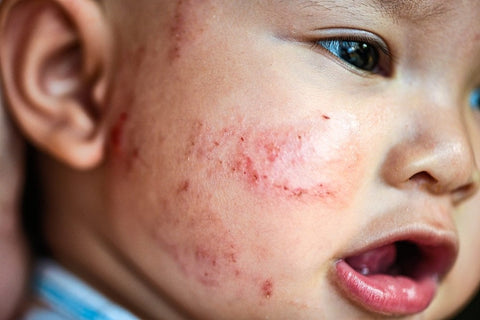Eczema is a skin condition where the skin patches become itchy, cracks, inflamed, and rough. At times eczema can even cause blisters. Those suffering from severe eczema will often find flakey patches of red and irritated skin. Over time, the condition also results in your skin becoming weaker, thinner, and more fragile.

Atopic dermatitis is the most common type of eczema and is believed to be caused by immune dysregulation and environmental factors. Environmental factors include smoke, pollen, soaps, and fragrances may worsen eczema condition. Certain foods, such as nuts and dairy, can also trigger the symptoms of eczema. Eczema not contagious. Some people may outgrow the condition, whereas some people continue to have it throughout adulthood.

There are 7 different eczema types; atopic dermatitis, contact dermatitis, dyshidrotic eczema, nummular eczema, seborrheic eczema, and stasis dermatitis. Dermatitis refers to skin inflammation. People with eczema often have allergies or asthma, along with itchy, red skin. Eczema comes in a few other forms too. Each eczema type has its symptoms and triggers.
SYMPTOMS:
- Dry, scaly skin
- Redness
- Itching, sometimes intense
- Small, raised bumps
- Thickened, cracked, and scaly skin
- Swollen skin, sensitive skin

CAUSES
Healthy skin helps us to retain moisture and protects us from bacteria, irritants, and allergens. Eczema is related to a gene variation that affects our skin's ability to provide this protection. This condition causes our skin to be affected by environmental factors, irritants, and allergens. In some children, food allergies may play a role in causing eczema.
COMPLICATIONS
The complication of eczema may include:
-
Asthma and Hay fever -Eczema sometimes precedes the conditions. More than half of young children with atopic dermatitis develop asthma and hay fever by 13 years old.

-
Chronic, itchy, scaly skin - Eczema causes skin inflammation, which often starts with a patch of itchy skin, eventually lead to the itch-scatch cycle.

-
Skin infections – Repeated scratching can break the skin, which causes open sores and cracks. These sores and cracks increase the risk of infection from bacteria and viruses.

-
Irritant hand dermatitis – Irritant hand dermatitis is a form of contact dermatitis. The skin is injured by environmental factors such as cold, over-exposure to water, or chemicals such as acids, alkalis, detergents, and solvents.

-
Allergic contact dermatitis – This condition is common in people with atopic dermatitis.

-
Sleep problems - The itch-scratch cycle can cause poor sleep quality.

Treatment and management

The primary goal of eczema management is to improve life quality to ensure we participate in our school, work, social, and family activities. People with eczema often face social withdrawal issues or are socially stigmatized by others. Besides, sleep should be restful and undisturbed by the need to scratch the skin.
Managing itch

Chronic itchy skin is a universal symptom of most types of eczema. Eczema itch is usually diff from irritation from a bug bite/poison ivy. A common medication used for the itch, such as anti-histamines, does not work well with eczema itch. For many people, chronic irritation from eczema just likely to involve physically. People with chronic itch are more likely to experience poor sleep and mental health issues such as depression and anxiety.
Treating itchy skin

The most critical step in manage itchy skin is to reduce the risk of its happening in the first place. This can be done by moisturizing routine, clean and regular bathing, and using the prescription medication as prescribed without skipping. Medical experts recommend applying moisturizers liberally throughout the day to replenish the skin barrier.

Natural remedies for itch include soaking in the bath with oatmeal and baking soda. This can also be made into a paste and applied directly to the skin. Topical and immunosuppressant medications also reduce the symptoms of itch. In some cases, health care providers prescribe antidepressant medications such as mirtazapine, which effectively relieves irritation at night. Pramoxine, an anesthetic, or certain antibiotics is used for skin infections. Medical experts often advise not to scratch too much because it can lead to more rashes, inflamed and thickened skin, which may cause infections if the surface of the skin is broken.
Avoid possible trigger
One of the best eczema management is to avoid possible triggers of eczema. Getting to know the possible triggers and manage the flare-up is one of the best things we can do.

Irritants: Irritants such as chemicals, fragrances, certain fabrics, detergents, and smoke can further irritate eczema patients' skin.

These are few steps to follow to reduce irritant exposure:
- Wash new clothes before wearing them.
- Keep fingernails short and smooth to prevent scratching scars and injury damage.
- Wear comfortable clothing. Choose the right fabrics. People with eczema find that wool and synthetic materials, such as nylon and polyester, cause sweating, irritation, and overheating, leading to severe itchiness.
- If you go swimming, bathe immediately afterward to avoid exposure to chemicals found in swimming pools and beaches.
- Use broad-spectrum ultraviolet (UV) protective sunscreen (UV-A & UV-B) with 15 or more SPF.
Tips for itch relief
- Get to know your triggers and avoid your itch triggering.
- Apply cold cleansers.
- Use clear, soft, and breathable clothing.
- Use skin cleansers with lower PH.
- Pat the itchy skin or try to pinch. Avoid scratching as possible.
- Perform wet wrap therapy.
- Do cold compress with diluted apple cider vinegar.
- Moisturize frequently throughout the day with an ointment or cream that contains ceramides.

